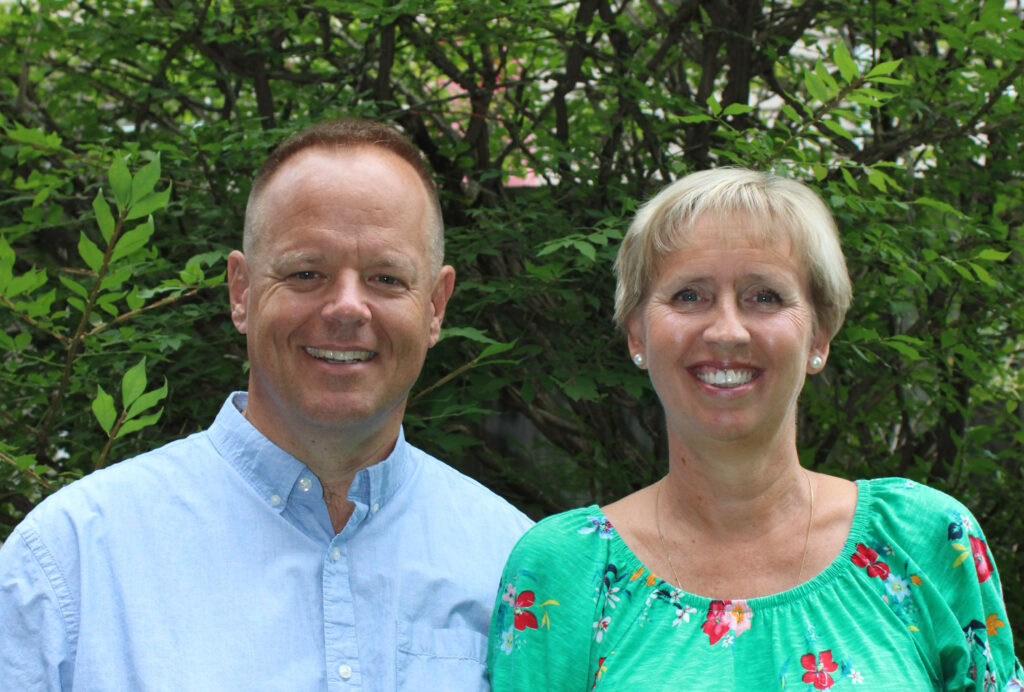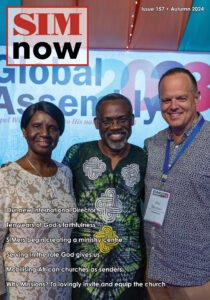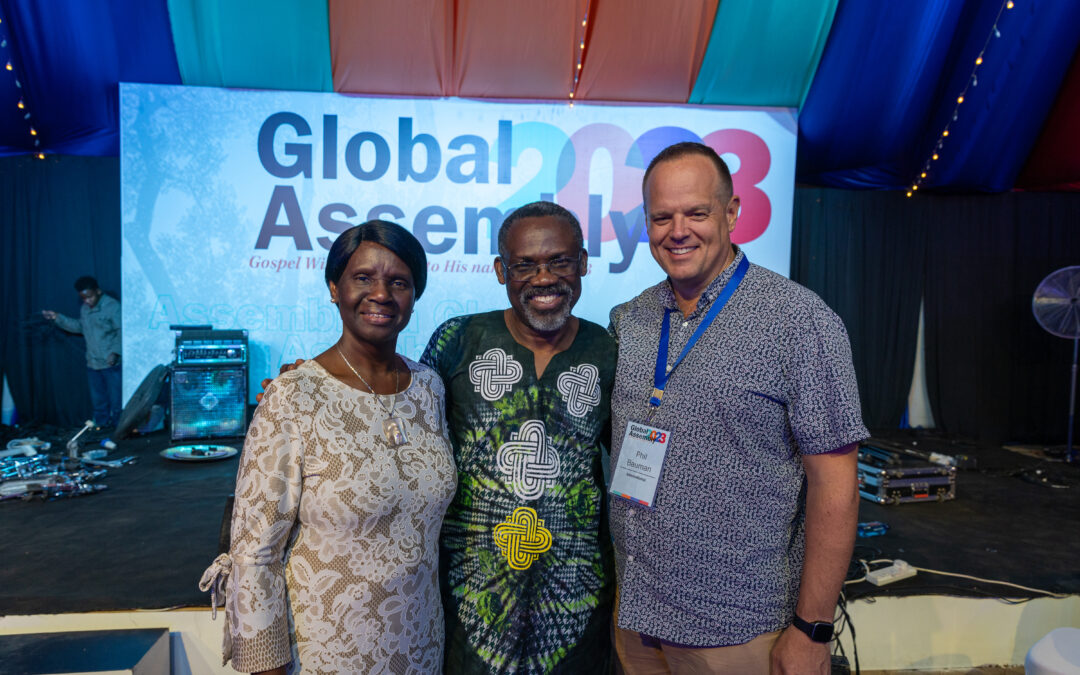SIM International’s new International Director, Phil Bauman, is praying that he can help SIM continue to grow in the direction set by his predecessor, Joshua Bogunjoko.
“I am honoured and humbled to have been confirmed in this role by a vote of SIM members and by the Board of Governors,” Phil said when appointed last September.
“Phil was the unanimous choice of the search committee and of the board,” said SIM International Board of Governors chair Gillian Phillips. “We are delighted he has agreed to take on this challenging role and can clearly see God’s hand in this. We pray for God’s blessing on his leadership and look forward to seeing the mission thrive under him.”
She said the Board of Governors confirmed him in September “after much prayer, a careful selection process, votes of approval by the Board, Global Assembly and mission members, and formal ratification by the Board.”
“I have worked closely with Phil for many years and firmly believe he is answering God’s call by taking on this role. I am excited to see his appointment and can clearly see the way God has led the search committee, the board and the whole mission in the process of selecting him,” Joshua said.
“Phil is a gifted leader and will, I am sure, lead this wonderful organisation with courage, wisdom and distinction. My prayer is that God will lead, strengthen and encourage both Phil and Andrea as they prepare for this significant step in their lives and as they face the challenges that will certainly lie ahead.”
Phil, 52, spoke to us during his sabbatical last October as he prepared for his new role. He started his five-year term on 1 March.
Like the search committee, Phil said he relied on prayer, the counsel of close friends and mentors, and trusting that the search team were faithfully following God’s will and direction.
“The phrase I use is ‘we trusted the process,’ and we trust that all of those involved were seeking God’s will and direction in it. When I was first asked to consider being part of the process, it was sort of ‘that’s too scary to contemplate, but I don’t really have a good reason to say no,’” he said.

Phil and Andrea Bauman (submitted photo)
He and his wife, Andrea, joined SIM in 2000 and served for years among the Sisaali people in northern Ghana. They have three grown children (including one finishing university) and live near Toronto, Canada.
Phil has an engineering degree and an MA in Mission and Theology. Andrea is a nurse by profession but has served in personnel since 2008; she is currently the International Personnel Coordinator.
Phil has served with SIM in senior leadership roles for more than 15 years, including as Ghana Director. He became a member of the International Leadership Team (ILT) in 2018 and the Executive Team in 2020, when he became the Global Director of Strategic Development.
Missionary service has been at the centre of Phil and Andrea’s life together from the beginning. They met at Mukinge Hospital in Zambia, where Phil, Canadian, visited for a practical work placement for his university studies in civil engineering and Andrea, British, was a nurse.
“When you’re there and being asked to design a new paediatrics ward, you must consult the nurses on the paediatrics ward …. We both just felt that for a Canadian and a Brit to meet there, maybe God has some ideas of what He would have for us,” Phil said, adding that they committed together that if their relationship continued, they would be open to Him calling them to serve in missions.
Making such a commitment was natural for Andrea (who had already served at a mission hospital) and for Phil, who was raised in a Christian home and a Bible-teaching, missions-minded church. He came to faith at age 7 but made it his own during high school and university.
They married, settled in Canada so Andrea could obtain Canadian citizenship, and worked a few years in their professions before pursuing vocational missionary service.
After wavering between joining SIM or AEF, they settled on AEF for the possibility of returning to Mukinge Hospital.
“Six weeks later, we were told, ‘AEF might be merging with SIM; how do you feel about that?’ We laughed,” he recalled.
After prayerfully considering assignment possibilities, they moved to northern Ghana, where they were involved in church planting, rural church development, health education, and water development. Phil said their service in Ghana provided many lessons from God.
“A big one for me was coming out of engineering, realizing that ministry of value is about relationships. You can engineer a solution to just about anything, but it doesn’t mean that it’s a solution that people actually want to use. When we come to gospel ministry, we can have all sorts of ideas and strategies, but it boils down to relationships,” he said.
Another big lesson, he said, was “the reality that God is already present in the places we go even if He is not named, and so it’s not that I bring the Gospel or that I bring Jesus, but rather it’s about helping people to see Him because He’s already there. As one of my professors in Ghana said, ‘The footprints of Jesus are all over the place; it’s our role as God’s people to help people discover His footprints in their culture.’ So, recognizing how God is at work, [and how] God is present even though He is not named. Our role as kingdom witnesses is to help people to see that God is already present in their midst.”
Likewise, evaluating our ministries should include considering how they align with SIM’s purpose and mission statement (printed below), the people and communities with whom we are engaging, and the change desired for them.
Phil believes SIM has many strengths, from our dependence on God (as expressed in our core values, printed on the facing page) to our broad representation of the body of Christ globally, denominationally, and ministerially.
“God has given us great people from all around the world, and part of that strength is, I believe, our growing diversity, where we have diverse teams of people ministering together in many, many contexts,” he said. “We still have a lot of western influence, but our global governance is not anchored in one particular context, or at least doesn’t need to be.”
Asked about his goals and priorities as he prepared for his new role, Phil said, “My caveat to this is [that] part of the role of sabbatical is to gain further clarity, so I wouldn’t say this is definitive, but at this stage, I would say that a goal and a challenge is that SIM would continue to become a diverse and global organization that facilitates the participation of God’s people from around the world to share the goodness of Jesus in communities where He’s least known, and so that piece of what does it mean to be global and diverse—we already are, but I think there’s a lot more that could be done.
“Part of that though is discerning where is that responsibility for SIM and where is God saying that is not SIM’s responsibility; that is for somebody else. I firmly believe that we have more to do; we can better serve or we can be more diverse and help people be engaged in what God is doing, but that doesn’t mean that our responsibility is to do it for everyone. So it’s to be a diverse organization but to recognize our own limitations and maybe limitations that God is giving to us.
“So, that would be one area, and I think you’re right: the opportunities and challenges are very much intertwined, because within that diversity piece, there are opportunities and challenges,” Phil said.
“Within that diversity piece, one of the challenges we face is, ‘How do we become a welcoming community where diverse people feel like they belong?’
“Another opportunity and challenge is continuing to focus on the purpose and mission that God has for us. I’m a hundred percent on board and behind our current Purpose and Mission statements. I see no reason to change those because I think we have lots to do to continue to pursue those and live them out. I think to do that well will require continued focus for us as an organization, and understanding what does that focus look like? How do we prioritize the places where we minister, the resources that we have to allocate, in light of our purpose and mission?
“Part of that I think comes back to this assessment of how do we understand that the ministries that we are undertaking do intentionally pursue the purpose and mission that God has given to us, and as an organization, that we desire to continue to assess our ministries to ensure that we are as focused on our purpose and mission as we could be.”
Please join us in praying for Phil and Andrea as they adjust to this new role and for him to lead according to the Lord’s will for His Kingdom.

This article is reprinted from SIMnow issue 157, available for download at https://sim.org.za/simnow/.
Text and photos by SIM International Communications Team & Brian Heffron, SIM South Africa Communications Manager
Photo at top: Phil Bauman became SIM’s new international director on 1 March, succeeding Joshua (Joanna) Bogunjoko, who led the mission for the previous ten years (pictured here in Kenya last year; photo by Brian Heffron).

